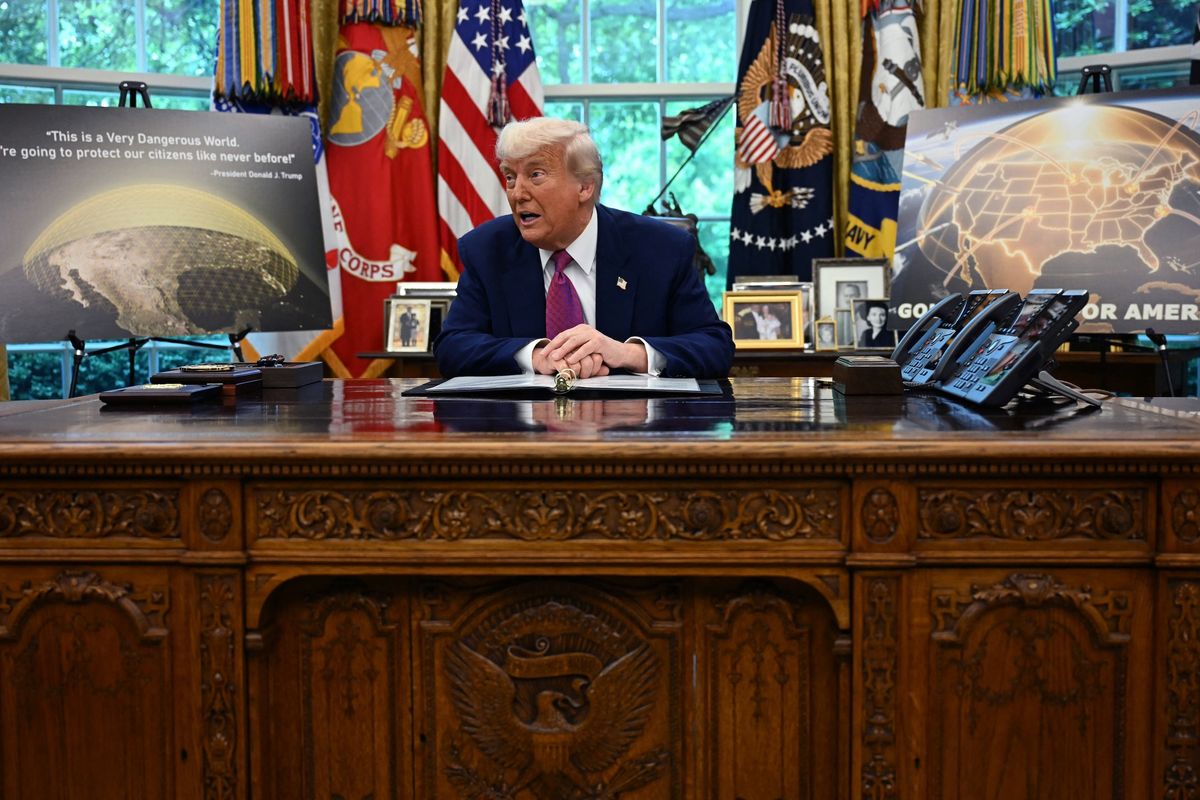OPINION — “Black swans” are events that arrive as unwelcome surprises and have significant effects on nations and societies. They can upend the status quo in politics, economics, or national security. Black swans are even more dangerous when superimposed on other black swans.
It’s always worth trying to anticipate potential black swans — indeed, after 9/11 the CIA created a unit, called the Red Cell, to do just that. But doing so is more necessary today than ever, given what is higher-than-normal fragility in the systems most often affected by these events.
Black swans come in two forms. The first are events that were simply not imagined before they happened, such as al-Qaeda using airplanes as guided missiles on 9/11 or the Russians using our own social media as a tool to attack our democracy in 2016. The second type are those seen as possible but were discounted as being highly unlikely, such as the current pandemic. Black swans can be domestic, such as Hurricane Katrina and its devastation of New Orleans, or foreign, such as Russia’s 2014 invasion of Crimea.
While surprises, black swans occur with enough frequency to be able to predict that others could easily occur between now and the inauguration next January of either a second term for President Trump or a first term for former Vice President Biden. As we survey the foreign landscape, which is where our expertise lies, we see several potential, near-term black swans.
One would be a Chinese move against Taiwan. In his recent article in the National Interest, Graham Allison of Harvard’s Kennedy School outlines the many parallels between today and the period leading up to the Japanese attack on Pearl Harbor, as well as some of the actions China might use to achieve this long-standing goal of bringing Taiwan under its control.
In addition to capitalizing on current distractions in the U.S., Beijing could see three reasons for moving now. Taiwan, under the leadership of President Tsai Ing-wen, is moving further away from Beijing; Hong Kong as a model for Taiwan of a “one state, two systems” is collapsing; and the U.S. has just made clear that it wants to deny China one of the products that it imports and desperately needs, semiconductors. China obtains many of its semiconductors from Taiwan.
China’s leadership, which tries to avoid the kind of international condemnation such a move would bring, could well view action against Taiwan as worth it, especially if Beijing calculates that the price would be ultimately mitigated given China’s growing economic power and the resulting tendency of nations to forget Chinese misdeeds when doing so is in their interest.
China’s intent would be to bring Taiwan under its political control without firing a shot. China’s actions would commence in the so-called gray zone and escalate incrementally. Early actions would include economic pressure, covert political interference ranging from disinformation operations to organizing street protests in Taiwan and buying political influence there. Beijing would leverage the threat of force, most likely through a well-timed military exercise, but would actually use it only if necessary and if victory were nearly certain.
Any U.S. administration would have a hard enough time making decisions on how to respond to such a crisis in normal times, but it would be far more difficult in the midst of a competitive election campaign superimposed on multiple ongoing crises. Even if the Trump Administration decided to come to Taiwan’s defense, a military move against Taiwan would be difficult to prevent given China’s symmetric and asymmetric military advances, the advantage of initiative, and the tyranny of distance the U.S. military would have to overcome to counter it.
Whether the U.S. acts or not, “losing Taiwan” would be a blow. Although the U.S. has no formal security treaty with Taiwan, and other regional powers would steer well clear of such a crisis, the U.S. is widely seen as the ultimate guarantor of Taiwanese security. U.S. credibility, therefore, would take a significant hit, from which it would be difficult to recover.
Another potential black swan in the months ahead would be a significant, even catastrophic, direct attack by ISIS in the U.S. conducted either by operatives sent here or by ISIS-organized, radicalized individuals already here. The group is on the rebound in Iraq and Syria, fueled by a drawdown in coalition forces, COVID-related disruptions to Iraqi security services, and the continued marginalization of Sunnis in Iraq.
ISIS attacks in Iraq are on the upswing. There were over 550 ISIS attacks in Iraq in just the first quarter of this year. Outside the Middle East, German authorities in mid-April arrested four Turkmen citizens who were allegedly planning attacks on U.S. military facilities. The four were in contact with senior ISIS officials in both Iraq and Afghanistan. They had already purchased weapons and were in the process of acquiring explosives.
ISIS may well have learned from al-Qaida in the Arabian Peninsula (AQAP) that, with a little creativity, it is possible to get operatives into the U.S. AQAP did so by directing an operative to join the Saudi military as a pilot, where they knew he would likely be trained in the U.S. The result was an attack last year at the Naval Air Station in Pensacola, Florida that killed three.
A major ISIS attack in the U.S. just over a year after it officially lost its caliphate in the Middle East would shake the U.S. public, which believes a major attack here is no longer possible. It would also allow the group to attract new recruits and money and to reinvigorate its online messaging that was such a significant part of its threat to the West.
A third potential black swan could be a crippling debt crisis occurring simultaneously in many emerging markets. These nations, with their high growth rates and dependence on trade, are important players in the global economy. Entering the pandemic, they were already highly leveraged — with public and private debt at 170 percent of GDP — and their economies were slowing. Now, because they lack the tools to deal effectively with the health and economic effects of COVID, their need for capital is rising at the same time their debts are coming due. Argentina has already defaulted on its sovereign debt, and India’s debt is nearing junk status.
Because most emerging market debt is owed to western governments and financial institutions, should a number of emerging markets default at the same time, the consequences for the U.S. could be severe, deepening and lengthening our own economic downturn. It could even lead to a financial crisis here at home.
Other overseas black swans that are conceivable in the next few months include: severe political unrest in nuclear-armed Pakistan, which is being ravaged by the coronavirus, that results in the emergence of an extremist government there; economic and political collapse in Mexico, which is also struggling with COVID, that leads to a surge in illegal immigration into the U.S; and North Korea’s current ratcheting up of pressure on South Korea, because the North is dissatisfied that it has not received more tangible benefits from an earlier warming of bilateral relations, that results in some sort of military action that impacts U.S. troops on the Peninsula.
Finally, it goes without saying that severe political turbulence occurring in the United States this fall could yield yet another black swan, with truly catastrophic consequences. Such a crisis could result from impulsive foreign policy decisions — including unwise use of force — made in order to distract the electorate from bad health or economic news or increased unrest in our streets due to a failure to tangibly address the issues underlying ongoing social distress.
Or it could be caused by a disputed election outcome, spawned by any of a number of fragilities in existing state and local voting systems, that could not only require rapid and controversial judicial resolution, but — much worse — could result in violence on our own streets. The latter could conceivably remove the last shred of confidence the ambitious peoples of our broader world have in the American experiment.
All of these scenarios would be aggravated by a resurgence of the novel coronavirus pandemic, which is starting to feel increasingly likely. We’re not predicting that any of these black swans will actually occur, but both their likelihood and potential impact seems higher given the distracting political, economic, and health issues currently causing such turbulence in the U.S.
More importantly, we point them out as a cautionary note — that wisdom and resiliency in society, economics, and security becomes especially important at such a fragile time. What else is out there that we have not imagined?
Michael Morell, Former Acting Director, CIA
Michael Morell was a career intelligence officer. He served as deputy director and twice acting director of the CIA from 2010 to 2103.
Admiral Sandy Winnefeld (Ret.), Former Vice Chairman, Joint Chiefs of Staff
Sandy Winnefeld was a career Navy officer. He served as the ninth Vice Chairman of the Joint Chiefs of Staff from 2011 to 2015.
Read more expert-driven insights, perspective and analysis exclusively in The Cipher Brief
















